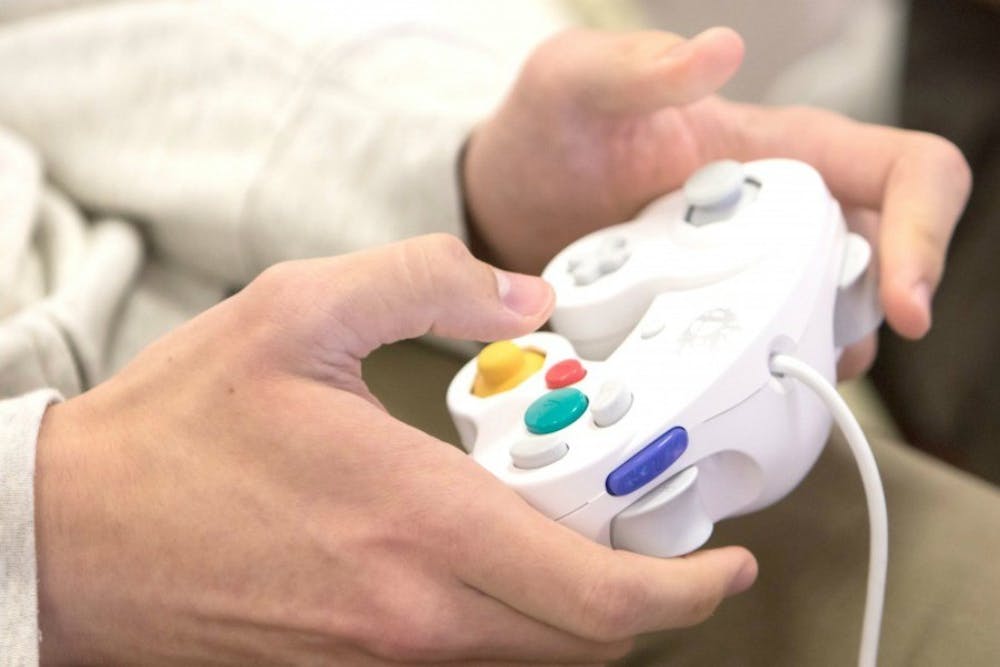By Dmitriy Kizhikin, The Miami Student
Rooms 207 and 213 in Benton Hall echo loudly with voices on a Saturday afternoon. Anyone entering the building would wonder what the commotion is about. Is there a football viewing party?
In actuality, Miami's Smash Club is hosting a "Super Smash Bros." tournament -- a party fighter game, where you choose a character and face other players. Hunter Hersko-Fuggitt, a first-year at Miami, has been playing "Smash" since high school and is a regular at events like these. The soft sounds of controllers clicking are almost comforting for him.
For Hersko-Fuggitt, "Super Smash Bros." is more than just a party game. He attends local and state tournaments consistently, winning money and recognition for being a top player.
Ever since the game's release in November 2001, tournaments have sprouted up around the world. The eSports scene started out underground, but it has grown into an industry with sponsors, professional players and major monetary prizes.
On March 14, Miami University announced their varsity eSports program, which will begin next fall. Now, players for games like "League of Legends" and "Super Smash Bros." can become nationally recognized and sponsored, and they have the opportunity to earn scholarships as well.
"Money is a rather big issue to attend tournaments," Hersko-Fuggit said. "Unless you are completely certain you are going to be in the top eight of a 128-player bracket, there's almost no reason to go out of state."
Weekly tournaments occur in Cincinnati and Columbus. For Hersko-Fuggit and his friends, this provides an opportunity to practice with new players, as there is only so much to be gained from playing with the same players over and over again. In the same way that traditional athletes need to face new teams in order to improve, eSports players must seek out new opponents if they want to become better.
The experiences necessary to grow and improve are not always easily accessible, however. The travel time and limited funding hinder growth. With the support of a varsity program at an esteemed university, students with passions in the evolving community of eSports can now thrive.
"Last time I went to Big House 5, a tournament that national players attend, I gained so much experience," Mitch Keller, another first-year, said. "I avoided anyone I knew and was able to play new players."
Despite the growing popularity of eSports, many fans of traditional sports are still skeptical of them.
"I find it odd that sitting for hours and playing video games is legitimate means for a scholarship at some schools," Susanna Smith, a first-year at Miami, said. "If video games can earn money, why are intramural sports not allowed to have scholarships?"
Players of eSports argue that there is a distinct difference between playing video games casually and professionally.
"A friend of mine who plays sports competitively understands what it means to have your passion recognized," Hersko-Fuggitt said. "Still, sports fans who don't really understand the drive behind real sports think that eSports is just stupid. To them, it's just video games."
Competitive players like Hersko-Fuggit and Keller sometimes spend three to four hours a day studying and playing "Smash". Not only is the game mechanically intensive, with inputs occurring every second, but there is strategy and depth in every match.
In the end, the opportunity for students at Miami to openly pursue their competitive interests with support from the university will improve the gaming community. For many, video games are for more than just stress relief.
"'Super Smash Bros. Melee' lets me express myself in a way that I can't otherwise," Hersko-Fuggit said. "I have a freedom in the game to be and do what I want, showing others my effort and determination. It's the best feeling when you are facing another player who is playing their heart out."

